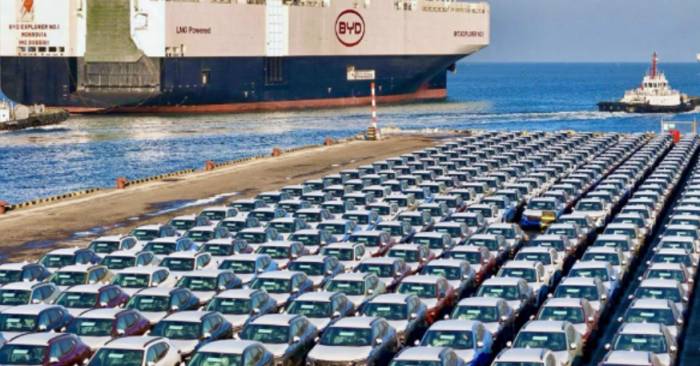Turkey has abruptly announced a 40% tariff increase on Chinese new energy vehicles, leaving many people bewildered. Our domestically produced electric vehicles have been thriving in foreign markets; how did they suddenly face such a significant blow? Is Turkey trying to emulate M country's tactics to throw a wrench in our works?
Why have Chinese new energy vehicles fallen out of favor?
Speaking of which, China's new energy vehicles have been a dark horse in recent years. From being labeled as "products with no quality, no brand, and no core technology" to becoming "internationally sought-after," the journey has been truly challenging. Brands like BYD, NIO, and XPeng have become well-known in the international market. Especially BYD, which last year surpassed Tesla in global sales, becoming the "leader" in the new energy vehicle industry.
However, just as we were basking in our success, the international market began to criticize Chinese new energy vehicles. Accusations of "excessive subsidies" and "unfair competition" have been leveled against us, essentially pinning various "charges" on us. M country announced last year that it would raise tariffs on Chinese new energy vehicles to 100%, and now it seems Turkey is following suit.
Some argue that this is a classic case of "the thief crying 'thief'"! When they had a monopoly on the market, where was the call for fair competition? Now that our technology has caught up, we have become a "thorn in their side." This double standard is indeed somewhat speechless.
Is Turkey's move to please M country or to extort?
Turkey's sudden increase in tariffs has many underlying motives. Some say it's to curry favor with M country, given the often turbulent relationship between Turkey and M country. By doing this, perhaps Turkey can gain political and economic support from M country.

Others believe that Turkey is copying M country's "extortion" tactics. First, they hit you hard, and then they negotiate terms slowly. Maybe in the end, they can extract some technology transfer or investment promises from China?
Regardless of Turkey's intentions, this approach is undoubtedly a blow to international trade order. Our Ministry of Commerce has already lodged objections with the World Trade Organization, stating that necessary countermeasures will be taken. This game of chess is likely to require some further contest.
Are the "hard times" coming for Chinese new energy vehicles?Some are concerned that the recent increase in tariffs by Turkey might just be the beginning, and they wonder if more countries will follow suit in the future. If that's the case, won't our new energy vehicle industry be facing a "cold winter"?
Don't panic, the situation is not as bad as it seems. The competitiveness of China's new energy vehicles is solid and not based on low prices. Take BYD, for example; their technology is at the world-leading level. Even with increased tariffs, they will still be able to sell their products.
Our market is vast! Even if there are setbacks in foreign markets, the domestic market is more than capable of supporting the industry's development. Moreover, emerging markets like Southeast Asia and Africa are very welcoming to Chinese new energy vehicles.
So, instead of worrying about the arrival of "hard times," it's better to think about how to make our products better and expand our markets. After all, strength is the ultimate truth!
What impact does this have on us ordinary consumers?
After discussing this for a while, you might ask, what does this have to do with us ordinary people? In fact, the impact is quite significant.
If foreign markets are restricted, car companies may pay more attention to the domestic market. This may not necessarily be a bad thing for us consumers. We might be able to enjoy more discounts and services.
Increased international competition forces domestic car companies to increase their investment in research and development and improve product quality. This will definitely be beneficial for enhancing our driving experience.
However, it's important to note that if trade frictions continue to escalate, it may affect the entire industry chain. In the end, the rise in raw material costs will still have to be borne by consumers. Therefore, we need to pay close attention to the development of this issue.
Where is the future of new energy vehicles headed?In the final analysis, new energy vehicles represent the direction of future development. Whether it is to address climate change or to ensure energy security, the development of new energy vehicles is an inevitable trend.
Although there are some obstacles at present, it does not affect the long-term development of new energy vehicles. Just like the mobile phone industry at that time, who would have thought that China has now become the world's largest producer and consumer of smartphones?
Therefore, we still need to have confidence in the new energy vehicle industry. As long as we persist in innovation, continuously improve technical levels and product quality, we believe that one day, "Made in China" new energy vehicles will become the first choice for consumers around the world.
This trade friction may just be a small hurdle on the road to the development of the new energy vehicle industry. After crossing this hurdle, the road ahead will be broader.